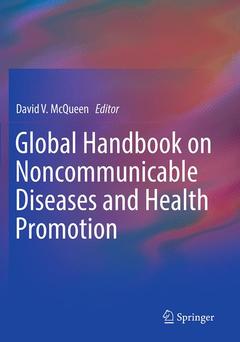Description
Global Handbook on Noncommunicable Diseases and Health Promotion, Softcover reprint of the original 1st ed. 2013
Coordinator: McQueen David V.
Language: English
Subject for Global Handbook on Noncommunicable Diseases and Health...:
Publication date: 09-2016
Support: Print on demand
Publication date: 08-2016
Support: Print on demand
Publication date: 07-2013
481 p. · 17.8x25.4 cm · Hardback
Description
/li>Contents
/li>Biography
/li>Comment
/li>
Global Handbook on Noncommunicable Diseases and Health Promotion
David V. McQueen, editor
A scan of health challenges around the globe readily brings to mind a range of infectious illnesses, from HIV to influenza. Yet chronic non-contagious conditions--heart disease, asthma, diabetes, cancer--are more prevalent, and their rates soaring, across the developed and developing worlds.
The Global Handbook on Noncommunicable Diseases and Health Promotion is an important resource for understanding and approaching chronic illnesses and their prevention. This timely text balances theory and strategies to provide an integrative context for health-affecting behaviors regarding tobacco use, food choices, and physical activity. Coverage expands on current medical/clinical public health perspectives, arguing that closer attention to social context is crucial to better use of health resources and more relevant preventive efforts. Possible roles for hospitals, the workplace, government agencies, NGOs, and other institutions are analyzed, as is the potential for addressing larger underlying health factors (e.g., inequities and poverty) at the societal level. Topics covered include:
- The nature of causality: beyond traditional evidence
- Learning from the social sciences in chronic disease health promotion
- Contextual factors in health and illness
- Understanding and applying a social determinants of health framework for addressing NCDs
- Public health, NCDs, health promotion and business partnering
- NCDs and civil society: a history and a roadmap
As the authors of the Global Handbook on Noncommunicable Diseases and Health Promotion make abundantly clear, opportunities are as numerous as the issues, and researchers and graduate students in global public health, health promotion, and chronic disease epidemiology will find these chapters positive and realistic.p>
David V. McQueen is a global consultant in health promotion, based in Atlanta, GA, USA. and retired from 20 years at the CDC in Atlanta where he served government as Chief of the behavioral risk factor surveillance system (BRFSS), Director of the Division of Adult and Community Health (DACH) and as Associate Director for Global Health Promotion. He has held Professorships on the faculties of the University of Edinburgh, where he directed the Research Unit in Health and Behavioral Change, 1983-1992, and The Johns Hopkins University, SHPH, 1972-1983. He also brings rich NGO experience as a globally elected Board Member of the International Union of Health Promotion and Education as well as serving for 8 years at the Vice President for Science and 4 years as President; he is currently the Immediate past President of IUHPE. He has served on numerous consultancies and committees with the World Bank, WHO, the Canadian Government, as well as other public and private agencies. He brings editorial experience as a member, present and past, of several editorial boards. He is widely published in academic journals and the author/editor of several books. He is currently an Adjunct Professor in the Department of Behavioral Sciences and Health Education at Emory University in Atlanta.
A comprehensive book that represents the breadth of present day work in the area of chronic disease control
Goes beyond a single risk factor for chronic disease or single diseases, and instead takes on the full complexity of chronic disease and health promotion efforts globally
Critically analyzes current approaches for addressing the challenges of NCDs in different social, economic, and political contexts




